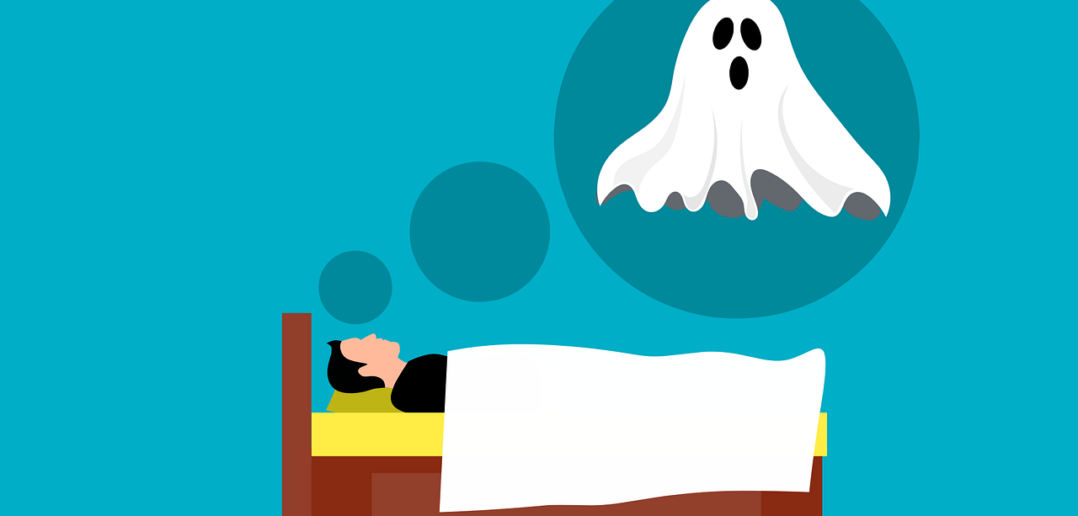Have you ever had trouble sleeping the night before a big meeting?
You’ve spent all week preparing for it, but just as you shut your eyes to go to sleep you think:
“I need to get a good sleep tonight or else I won’t perform tomorrow.”
And then “it” happens.
Even though you’re well prepared for your meeting and were dead tired a few moments earlier, your mind finds some superhuman reserve of energy and starts to wake up.
This alertness is created by your stress response releasing norepinephrine (adrenaline for the brain), because it has detected a new threat:
If I have trouble sleeping…
- I’ll forget what to say.
- I’ll lose the client.
- I’ll be embarrassed.
- I’ll let my manager down.
- I’ll lose that promotion.
- Maybe I’ll lose my job?
- I’ll never recover from this.
“If I have trouble sleeping tonight, bad things will happen tomorrow.”
As your mind cycles through these thoughts, they get louder and louder, making it impossible to fall asleep.
This is performance anxiety in its purest form.
However, this anxiety is less about how you’ll perform in your meeting tomorrow and more about your sleep performance. Performance anxiety happens when we put too much pressure on an outcome and in this case, that outcome is falling asleep.
To prevent this from happening in the future, here is a 6-step guide to follow when you have trouble sleeping.
1 – Follow A Strong Bedtime Routine.
Falling asleep the night before an important meeting is similar to Steph Curry standing on the free throw line with the game on the line.
Following a routine provides structure and calms the nervous system by taking pressure off the outcome. Routines allow us to block out external factors, focus on what we can control and increase our chances of reaching a desired “state” (i.e. feeling sleepy).
If you consistently cheat your bedtime routine and neglect healthy habits (i.e. good sleep hygiene), then you’re going to kick yourself on the nights when there is more pressure to get a good sleep.
Steph Curry follows the same routine before every free throw to achieve optimal basketball performance. Treat sleep like Steph Curry treats basketball and you’ll be well on your way to achieve optimal sleep performance.
Simply Google “Sleep Hygiene tips” and you’ll find plenty of actions you can take to build a healthy bedtime routine that works for you.
2 – Label it as Performance Anxiety
When our mind is spiraling out of control, it can feel all consuming. All we can think about is imagining the worst possible outcomes of having a bad sleep coming true.
Instead, step back and ask – What’s actually going on here?
The wakefulness you’re experiencing is simply your stress response pumping norepinephrine through your brain at a suboptimal time, which is increasing your brain activity (racing thoughts).
These racing thoughts are symptoms and what’s actually going on is you’re experiencing performance anxiety. It’s temporary and something you can easily resolve with the right treatment.
3 – Burn It Off
Your brain has been flooded with extra energy at the wrong time due to the norepinephrine that was released. The quicker you can burn off this energy, the quicker your brain will tire and allow you to fall asleep.
A good way to burn off this energy is by doing a brain dump of all your thoughts into a journal or onto pad of paper. Don’t worry about sentence structure or forming cohesive thoughts, just keep writing down every random thought racing through your mind.
You’ll know when it’s time to stop writing when your brain “feels empty” and you have nothing left to write.
Just like it’s tough motivating yourself to go for a run on a rainy day, getting out of bed to grab a pen and paper in the middle of the night will be the toughest part.
If you have a big meeting the next day, make your life easier by leaving your journal and pen beside your bed. You may also consider buying a book light so you don’t even have to turn your bedroom light on.
Keep in mind the longer you let your performance anxiety run wild, the longer it will take to calm down, so use this point as an incentive to get moving.
Click Here To Stop Letting Stress Impact Your Commission Check
4 – Acknowledge You’ve Had Trouble Sleeping Before
With your mind now empty, lets fill it with some better thoughts because this is not the first time you’ve had performance anxiety about sleep.
We can build confidence and take more pressure off of falling asleep by writing about a time when we had a bad sleep, but still performed well on an important task the next day.
These journal prompts will help:
- Write about a time when you performed well on an important task after sleeping poorly.
- How did you perform overall?
- What was the worst outcome of being tired?
- Did anyone even notice?
Writing about these past experiences will give our mind a helpful anchor point to feel less threatened by the possibility of not sleeping.
5 – Put A Plan In Place
Before you put your pen and paper away, the last thing you can do to help your brain feel at ease is to put a plan in place for tomorrow.
The good news about a presentation or an important meeting is in most cases, even if you have a bad sleep, you only really need to be “on” for an hour or two max. That means you can plan actions that temporarily boost your wakefulness and align them for when your meeting is scheduled to take place.
For example, all of these activities can boost our energy, focus and alertness before a meeting if you time them appropriately:
- 20 minute HIIT workout.
- Direct sunlight.
- Avoid high carbs.
- Avoid overeating.
- Eat high protein.
- Taking a nap.
- Cold shower.
- Music with high BPM.
- Caffeine
- Wim Hof breathing.
As you look at your schedule tomorrow, pick 2-3 of the actions above and plan to do them shortly before your meeting (timing for each action will vary so message me if needed).
This is your contingency plan if you continue to have trouble sleeping and absolutely cannot fall asleep. Having it will de-risk future underperformance due to fatigue and further help your brain feel less pressure to fall asleep.
6 – Inhale 4 Seconds, Exhale 6 Seconds.
With your mind tired, anchored on more positive thoughts and a plan in place for tomorrow – you should be feeling less anxious and more sleepy than you were a few minutes earlier.
The last step is to use your breathing to move further into a more relaxed and calm state, in which you’re able to fall asleep. To do this you want to follow this simple breathing cadence:
- Inhale for 4 seconds.
- Exhale for 6 seconds.
- Repeat 12-15 times.
As a general rule of thumb, we can increase our heart rate by inhaling longer and more forcefully than we’re exhaling (i.e. when we’re running). And we can decrease our heart rate by exhaling longer and more forcefully than we’re inhaling (i.e. the above cadence).
Moments ago when your performance anxiety peaked, your heart rate spiked.
In addition to the previous steps, following the breathing cadence above will help your heart rate slow down and put you in a better state to fall asleep.
Rather than counting sheep, you’re counting the rhythms of your breath.
You’ve Got This
Remember that the human body is extremely resilient and adaptable.
Across the world there are millions of soldiers fighting wars, doctors saving lives, new parents raising kids and successful sellers just like you who are succeeding despite being under slept. A night of bad sleep will be unlikely to make a major difference in how you perform tomorrow.
Go easy on yourself, follow the steps above and develop a strong bedtime routine that will help make you more resilient to performance related sleep anxiety in the future.
For more strategies to Stress Less and Sell More, click on the link below to see our mindset, resilience, stress-management and Mental Health community for sellers.
Click Here To Stop Letting Stress Impact Your Commission Check
About The Author

Jeff Riseley is currently the Founder of the Sales Health Alliance and Mental Health Advocate. With over a decade of sales experience – Jeff understands the importance of Mental Health in achieving peak sales performance.
Jeff combines his sales and Mental Health expertise to improve sales performance through mental health best practices. His strategies have helped sales teams become more motivated, resilient and better equipped to tackle stressful events within sales.




